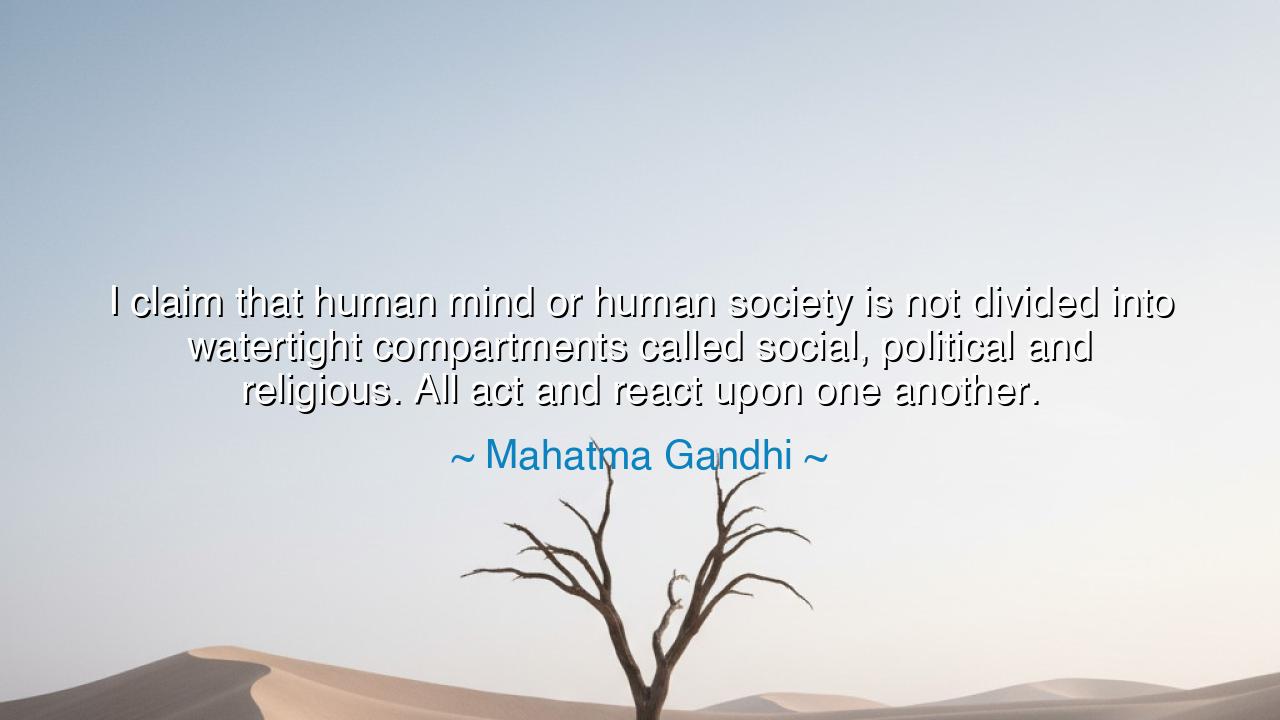
I claim that human mind or human society is not divided into
I claim that human mind or human society is not divided into watertight compartments called social, political and religious. All act and react upon one another.






The saint of truth, Mahatma Gandhi, spoke these luminous words: “I claim that human mind or human society is not divided into watertight compartments called social, political and religious. All act and react upon one another.” With this utterance, he shattered the illusion of separation. He revealed that the forces that shape mankind—faith, power, and community—are not walls standing apart, but rivers that flow into one another, mingling, rising, and reshaping the land of human destiny.
To the shallow eye, the social, the political, and the religious appear as distinct realms. One may say, “This belongs to faith; that belongs to law; this other to custom.” But Gandhi, with the vision of a sage, saw deeper. He knew that a man’s beliefs guide his actions, his actions shape his society, and his society births his politics. These spheres are not compartments but threads in one fabric, and when one thread is pulled, the whole cloth trembles.
History confirms this wisdom. Consider the Abolition of Slavery in the nineteenth century. It was not merely a political act of laws and decrees. It was also a religious movement, where voices of faith thundered that every man was a child of God, unfit for chains. And it was a social transformation, changing the lives of millions and altering the very structure of nations. Politics, religion, and society were not separate—each acted upon the other, until the evil of bondage was broken.
Gandhi himself embodied this truth. His political struggle for India’s independence was inseparable from his religious devotion to truth and nonviolence, and it was rooted deeply in the social fabric of village life and community upliftment. When he spun the wheel of khadi, it was not merely an economic act—it was spiritual discipline, political resistance, and social reform entwined in one simple gesture. To divide them would be to misunderstand him entirely.
The meaning of his words is clear: no part of life is untouched by the others. If religion is corrupted, politics will grow tyrannical. If politics is unjust, society will suffer. If society is cruel, faith will wither into hypocrisy. But if one is purified, the others may also rise. Thus, the wise must tend to all, understanding that harmony is only possible when the mind, the community, and the state act as one body, not as scattered fragments.
The lesson for us is urgent: do not live as though your faith has nothing to do with your actions, nor as though your civic duty has nothing to do with your morality. Do not imagine that society can be healed while politics rots, or that politics can be cleansed while society decays. All are bound together, like the organs of the body. When one sickens, all suffer. When one is healed, all thrive.
Practical wisdom flows: live with integrity in every sphere. Let your beliefs guide your conduct; let your conduct shape your society; let your society demand justice in politics. Do not isolate your soul from your duties, nor your duties from your conscience. Ask yourself daily: “Are my actions consistent with my faith? Are my social dealings guided by justice? Does my political voice echo compassion?” For in such unity, the individual becomes whole, and the world is renewed.
So let Gandhi’s words dwell in your heart: “All act and react upon one another.” Remember that no wall divides the spirit from the world. To live as if they are separate is illusion; to live in harmony with their unity is truth. And he who understands this unity will not only change himself, but will touch the very destiny of mankind.






AAdministratorAdministrator
Welcome, honored guests. Please leave a comment, we will respond soon